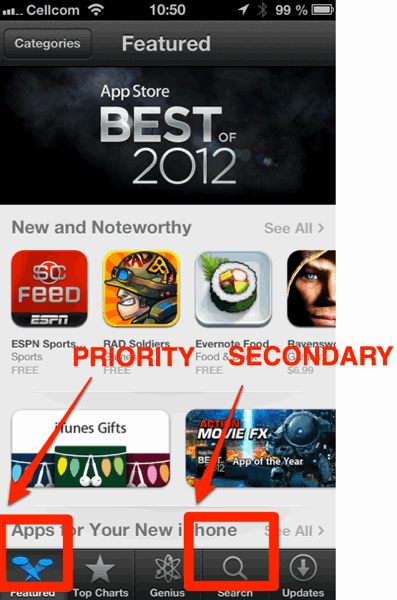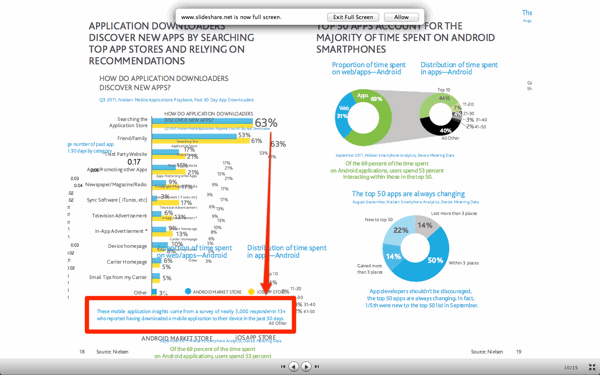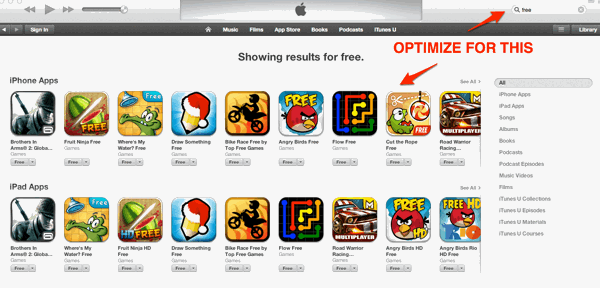For some reason, many developers and bloggers still want to believe the world of Apps will behave the same way the world of websites has behaved: moving from a directory to a super miraculous way of discovering better apps through a wonderful, yet to be built new search engine.
But that is not going to happen. No matter how much we want to believe it.
App discovery is a totally different beast: search is only a tiny chunk of discovery. How do we know? Well we not only looked at our own data (about 20/30% of users only search) but also compared with some third party discovery destination who all have a search engine. We also asked successful developers if what generated most download volumes for them was based on search and the answer is clearly no
If search was critical to discovery today, even the App stores are a data black box, developers would see a critical impact on their download curve when they make changes to their App metadata (keywords, description,…) But the reality is that what creates most uplift is not search. And how could it, of all discovery mechanism presents in the App store and Google Play, search represent only less than 20% in real estate and is not place in the forefront of the stores.

So is Nielsen Research (Q3 2011…) declaring that 63% of App downloaded come from search correct? We seriously doubt it. First it is based on declaration (of a few thousand users) and not hard data. Second it is more than likely participants in the panel consider search anything that is related to the “intention of finding” and finally it does not state what is the proportion of apps downloaded that come from that method but only what method comes in top of mind. So overall this data is very questionable and we would not use it as a reference.

Now, based on the myth search is critical to app discovery a new breed of App services have come to life: App Store Optimization, which help optimize your presence in the store AND improve your ranks. The problem is that those services have failed to prove to date that App Store optimization creates a major uplift in user acquisition and growth. We would like to see consistent cases where tweaking keywords and other parameters would multiply your download rate by 10 or more and at scale….but this has not happened yet.
Those services live from the dream many developers have that search is critical to growth in the App stores world. It. Is. Not.
In addition what we observe is that the majority of things searched a elementary queries like FREE, FREE GAMES, GAMES, GREAT APPS or even Best seller names like “ANGRY BIRDS, WHATSAPP,…” Try to optimize for that …

But it may change wouldn’t it? Google could become that Couldn’t it? That’s really uncertain and that is ignoring the key difference between apps and sites.
Downloading an app is mostly an act of entertainment (with some exception), when search a site is mostly about Information
Music, Movies, Apps behave in that sense in the same way and users, when considering entertainment require a different type of discovery mechanism which does not rely on search: because the element of surprise and taste is critical.
Matching an app with a users is not about information matching but personality and taste. And the best way to serve that is not through search because it is not about capturing an intention but guessing an intention before it is even expressed.
Does Google or Apple own Discovery for movies and music? They don’t in spite of years of expertise in their respective fields. Pandora and radios in general, Imdb, Flixster, Allocine and many more are way better suited for discovery than Google or Apple.
Search can’t win with apps because it will always be about anticipating an intention and not expecting the user to express it. For this to happen the paradigm of search has to be put behind and a new way to merchandise apps has to be imagined.
Browsing lists is by far the most popular way of discovering apps. This is why being featured by Apple and Google is the #1 source of downloads (something Nielsen is ignoring by the way in their report). Lists are popular because it is more convenient than searching but also because the vast majority of downloads happen in a situation where you do not know what to download or maybe do not know how to articulate what to download.
Lists are convenient because they serve well a passive attitude that is specific to mobile and that can’t be compared to an active attitude on the computer.
The App stores have to solve also a dilemma: They educate users in finding FIRST hits (top ranks) vs FIRST what is most relevant to them. But do they really want to change that agenda? Will their priority be more of a place where you can find hits vs what is right for you? And, remember, on the mobile you have don’t have much options: the default settings and order of display is what matter will matter.
In that respect, Lists have a problem: they are made the same for every one. They are also merchandised in a way that force every one to see them, even if they do not want to.
Passive discovery has to be re-imagined. Not search. Personalisation and taste capturing has to be re imagined. But do App stores really want that? Do they prefer a place where hits are the FIRST key driver to discovery or FIRST a more a long tail personal discovery experience?
It is about agenda. It is not about technology.
And if the app stores’ agenda is not the same as the user’s agenda then there will be a very significant place for third party app discovery services who are not based on search first.






